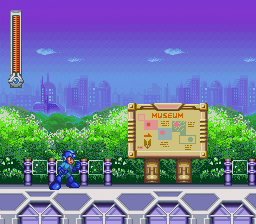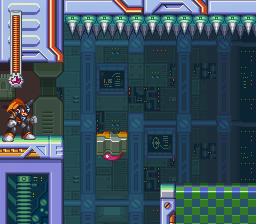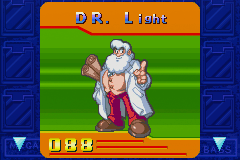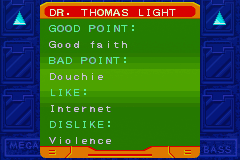


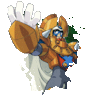
After the release of Mega Man 8 for the PlayStation in late 1996, Capcom decided to throw a bone to the Japanese gamers who hadn't quite entered the realm of CD gaming, and that bone, released exclusively in Japan on the Super Famicom (SNES) in 1998, was known as Rockman & Forte, or Mega Man & Bass in Americanese. The game used graphics and a few bosses from Mega Man 8 and sounds from Mega Man 7 to achieve a strange mishmash that doesn't feel much like either game. This type of thing wasn't entirely unheard of—in fact, that's the story behind Castlevania: Dracula X, also on SNES, which was derived from the TurboGrafx-CD game Castlevania: Rondo of Blood. Dracula X, however, had enough in common with its source material to lead gamers into believing that it was merely a watered-down port of Rondo, whereas Mega Man & Bass does a lot more to set itself apart from Mega Man 8. I just realized... isn't it strange that with Castlevania, the US didn't get the original CD game, yet we did get the SNES game based on it, but for Mega Man, it was the exact opposite? Whoa...
...Anyway, onto the review!

Mega Man & Bass doesn't pull a lot of punches; it's a tough game. With that being said, however, I remembered it being a lot harder than I found it in my recent playthroughs. I had previously played through the GBA port, and upon finishing it, I told myself I'd never play through it again. However, when I picked up the Super Famicom version recently, I found that the difficulty was balanced with the fun factor well enough for me to want to go back for a second and even a third playthrough. It's up there in terms of Mega Man difficulty, but if you're a junky for games that are "oldschool hard" like I am, you should be right at home. The game allows you to play as, surprise, Mega Man or Bass. You pick your poison at the start and that's who you'll play as for the whole game. Mega Man plays, well, as you'd probably expect, but Bass plays pretty differently. He's able to dash like X, double-jump and punish enemies with machine gun fire in eight directions. That's right—Bass has mastered the dark art of bending his arms. Basically, Bass is kinda just easy mode. That's okay, though, because he's cool.
The game has a shop system much like the one in Mega Man 8. You trade the bolts you find for items, some of which are permanent enhancements, and some of which you have to swap betwen in the menu. This adds a pretty cool dimension to the game and makes things a bit easier for our robotic heroes. I resent whoever at Capcom decided to get rid of Energy Tanks, but Mega Man can buy an equip that lets him slowly recover health while standing still. Not quite as handy, but it does the job. Bass has no such item, however, as both characters have a few exclusive items. Some of Mega Man's other items allow him to call upon Rush, Beat and Eddie, and Bass can buy different enhancements for his blaster as well as call on Treble and fuse with him. Bass also has an item which lets him climb ladders faster, which is... silly. Besides having different items, the charcters' movesets sometimes force them to traverse stages differently. Bass occasionally has to stand and fight when Mega Man can just slide under an obstacle. This balances things out a bit, buuuuuuut Bass is still easy mode.
Scattered throughout the game's stages are collectable CDs, 100 in all. Each CD contains an image and some info about a different classic series Mega Man character. Even some lesser-known robots, like the ones from the Game Boy games and Wily Wars are represented. Your collection is saved to the cartridge rather than to the individual save files, which is nice, as some of them are a huge pain to get. I'm looking at you, card near the end of Ground Man's stage. That brings us to the save files. The game has four save slots, which is kind of crazy for a non-RPG Capcom game on the SNES. Every previous Mega Man title on a cartridge had a password save system, as did Capcom's other action games, like Demon's Crest. Annoyingly, the game doesn't save your progress between the final trio of stages. It will prompt you to save between each stage, but it doesn't remember which stage you were on, so if you don't know that and turn the game off, you'll come back to see that you have to start the whole marathon over. Regardless, it's nice to be able to save. They probably only did it that way because if they had to keep up with every stage cleared, every item from the shop bought and every single CD out of a hundred found, the passwords would have looked like novels written in machine code.

The game reuses some sound effects from Mega Man 7, as I said before, but all the music is original. I'm pretty sure even the instruments are unique. This is one of those games where the music quality varies pretty wildly. There are some songs I'm whatever on, some songs that kind of get on my nerves and some songs that I can't get enough of. The level select theme is definitely the worst track and the Burner Man stage theme is a little bit annoying, while on the other hand, the museum stage and Tengu Man stage themes just blow me away. As for sound effects, there are these little robot penguin enemies that shoot forward with rocket thrusters, and if they hit a wall, it makes a unique "thunk" sound that always cracks me up. That's about all I have to say about the sound effects...

The game has nice, colorful graphics, but I can't give it too many props for this because, again, a lot of them are ripped from Mega Man 8. However, I find this game to be more visually pleasing than its predecessor. For one, I prefer the robot designs in Mega Man & Bass. Burner Man vs. Search Man is like, the most one-sided character design contest in history. Mega Man 8 also has these large elaborate backgrounds in each stage which you'd think would be a good thing, but to me, they seem a little out of place in a Mega Man game I'm not entirely sure why... Maybe I just find them less charming. The more simple backgrounds in this game feel more like Mega Man.

I have to go off of the Game Boy Advance port here, since I'm not even close to fluent in Japanese. Mega Man games all have about the same level of story, and this one isn't much different. A royal robot named King helms a robot uprising against humanity, and it's up to Mega Man to stop him. It seems slightly more mature than the other games, though. It's more on the level of some of the Mega Man X games. The characters are generally written pretty well and Proto Man even gets to shout an attack name before unleashing a devastating blast, which is always cool.

From the story of this game's conception, you'd be forgiven for expecting it to be nothing but a cheap cashgrab, but there's a lot more to it than that. I can't say for sure if it'd break my top five in the classic series, but I definitely like it better than Mega Man 8, which is sort of funny. It's like making lunch from the scraps of last night's dinner and the lunch ends up tasting better. Overall, it's a pretty solid addition to the series, and I'd recommend it to any Blue Bomber fans who haven't checked it out yet. It has a little something for everyone.
Published 1/16/24

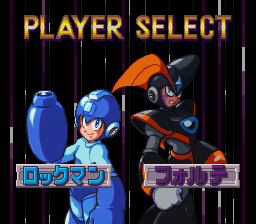
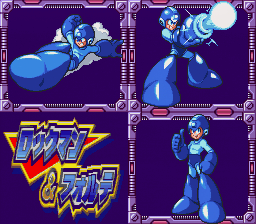
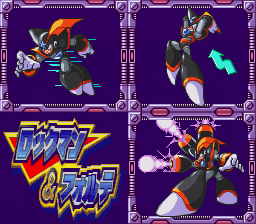





Released 4 years later in 2002, the GBA port of Mega Man & Bass is basically identical to the original aside from four things.
One, it has a smaller screen. This is sometimes made up for with some clever camera panning, but some other times you'll just barely be able to see the top and bottom of the screen, as seen below.
Two, the sound is different. This might be kind of a "no duh" thing to mention, but for every GBA conversion of an SNES game's soundtrack, I always see someone who's probably deaf say, "z0mg, the GBA soundtrack is soooo0ooo much bett4r!!!" Well, Mega Man & Bass actually has a pretty strong case. I won't say it's better overall per se, but I genuinely prefer the GBA versions of a few tracks.
Three, it has a "resume" feature which lets you quickly continue from the last autosaved checkpoint in a stage, barring, again, the fortress stages at the end. They had a chance to fix that and they didn't!
Four, the GBA port was officially translated, unlike the SNES version. That means if you're above fan translations or whatever and you care about the plot and/or the CDs, this will be the version to play unless you've studied up on your nihongo. This translation, however, has some... weird points. Most notably, the Dr. Light CD, shown below. Just... how?
